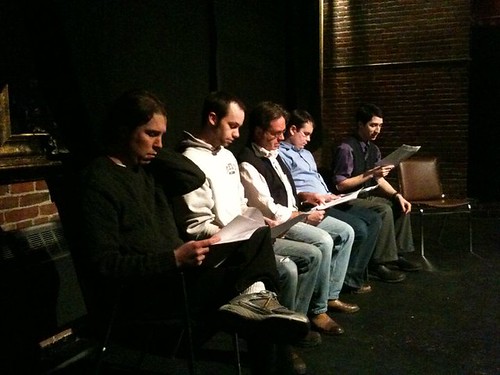
Left to right: Jesse Strachman, Chris Larson, John Greiner-Ferris, Kevin Mullins, and MJ Halberstadt, reading the parts of Il Capitano Spavento, Lorenzo, Antonio, Launcelot Gobbo, and Shylock in a scene from The Conversos of Venice as part of the Small Theatre Alliance's Open Mic Night at the Factory Theatre on the evening of February 21st. Photograph courtesy of the Small Theatre Alliance of Boston.
After grabbing a slice of pizza with CoLab Theatre artistic director Kenny Steven Fuentes, we headed to the Factory Theatre for an evening of staged readings. This was the first time I've participated in a reading where I was not actually running the show. That was left to Ron Pullins and Leslie Powell.
While in the past, when I have produced staged readings, I have often auditioned actors myself to make sure they were suited to the part (there's generally a smaller pool of actors to choose from for staged readings); this evening the actors were chosen at random from whomever came through the door with little time to review the scripts they were handed before.
I noticed over the course of the evening was the over-all high quality of the scripts. This is remarkable because I attend a lot of staged readings and though this was a completely uncurated event (hence, "Open Mic Night") the quality was better than what is presented at many companies' curated staged-reading series (which tells me that some companies playing in the "new play sector" are dropping the ball.) I will not be posting comments on anyone else's works-in-progress, especially since a number of them were only excerpts from longer works, though I will mention that I loved reading a part in Ron Pullin's short play, Pico.
Of course one of the ways we measure the value of a staged reading (despite what The New York Times says) is what the playwright learns about the play when it's read by actors in front of an audience.
I learned that I write in a style that necessitates the involvement of a dramaturg to keep the actors informed of cultural and historical context (the play, after all, is set in the Venetian Republic of 1601 and the scene in question has the characters referencing everything from religion to economics to folklore of the time while making allusions to both Shakespeare and the Bible.) In staged readings of Total War, which takes place in the far less alien world of an American university in the 1990s, I had been unwittingly playing the role of the dramaturg, figuring it was just my role as writer and producer. It's simply a tough piece to "cold-read" without rehearsal, even after I simplified the script by changing some Ladino, Veneto, and Italian words to their English cognates.
I learned that my predilection towards including clown characters when other characters are engaged in dramatic dialogue is a good instinct. There was also an interesting split in the audience that caught the various historical and literary allusions (often framed in jokes) those who did not, and those who were anxious because they were afraid that they were missing an important reference.
All I can do at this point, though, is get back to work!
Sunday, February 27, 2011
Thoughts After The Reading
Posted by
Ian Thal
at
3:34 PM
![]()
![]()
Labels: Factory Theatre, Small Theatre Alliance of Boston, theatre
Subscribe to:
Post Comments (Atom)



No comments:
Post a Comment